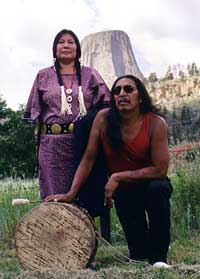
 |
|||||
|
|
|
|
|
|
|

Dave Swallow, Jr. was born and raised near Wounded Knee, SD on the Pine Ridge Indian Reservation and is a member of the Teton Lakota Nation, the band of Crazy Horse. He was taught the ancient Lakota ways by his Grandparents and is recognized by his own people, both on and off the reservation, as a Spiritual Leader and Sundance intercessor. He travels to teach about the sacredness of Mother Earth and to bring about awareness of the situation of his people back on the reservation.
David is fluent in his language, history, and of the treaties which were made and broken with the U.S. government. To sit with him as he sings these sacred songs and tells the stories of how the ceremonies, designs of the bead and quill work, and habits of everyday life came about will bring a smile to your heart and a compassion for a people in exile on the reservations. This exile places an impact on ceremonial responsibilities that do not have a place in modern political systems. In the Lakota way of living, ceremony and ritual is performed as a condition of living in a place. Their culture, which is a critical element for their survival as a people, is in great jeopardy of being lost completely.
When people are placed in the reservation systems, they are thrust into a barren place where they have to abandon former knowledge of this world. Through Lakota ceremony one learns of the stewardship and not ownership of the land, he learns humility and faith and comprehends the transcendent nature of reality and is initiated into the mysteries of the higher world. Dave will speak on the power of these traditional ceremonies and the importance of honoring these ceremonies in the way they were given by the spirit world.
David’s half side, is a descendent of a long line of medicine people from the Hunkpapa Lakota band of Chief Sitting Bull. Her great, great grandfather, Samuel Helper, was one of the few survivors of the infamous “Wounded Knee Massacre” which took the lives of 300 unarmed men, women and children in the winter of 1890.
Nyla continues her teachings from her grandmothers and shares many stories of how the woman’s role in Lakota life came about. Nyla was raised in the old traditional ways and brings much needed feminine perspective to the discussion of Lakota culture and spirituality.
Sadly, over a period of many years the purity of those ways has slowly eroded. Nyla is among the very few who have sought to preserve them in their original form. When we listen to her closely, not only can we hear the message, we can also feel it.